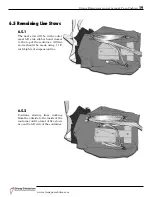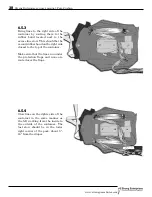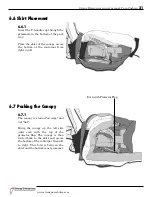
6
Strong Enterprises owner’s manual. Para-Cushion
www.strongparachutes.com
1.8 Service Life
FAA FAR 65.129 requires that “No certificated parachute rigger may pack a parachute that is not
safe for emergency use”. The continued airworthiness of an assembly is at the discretion of the
FAA licensed parachute rigger’s inspection during repack. While proper care can no doubt extend
its usefulness, an older parachute should be examined more closely for signs of deterioration. Your
parachute is a sensitive piece of life saving equipment and should be treated as such. However, it
should not be expected to last forever, even with proper care.
1.9 Preflight Inspection
The parachute must be inspected by the wearer prior to each use. Check it visually for any unsafe
condition. Be sure the harness is not twisted or misrouted. Be sure the fittings are not rusted. Be
sure the ripcord handle is securely in its pocket (under the fabric pocket covering). Lift Velcro® on
the back pad and check ripcord pins. Be sure they are properly seated in their loops. All pins should
extend at least 1/2-inch beyond the fabric locking loop. Be sure the rigger’s seal and thread are still
intact around the furthest pin. That is your assurance it has not been opened since it left the rigger’s
packing table. Check the packing data card in the nearby pocket to be sure that the parachute is
current and has been repacked in accordance with regulations.
1.10 Fitting the Parachute Harness
Strong Enterprises produces 3 basic harness designs: the standard fixed harness, the fully adjustable
harness, and the aerobatic harness. Below, please find proper fitting for each of these models.
Standard Fixed Harness - This harness has 3 adjustment points, one on the chest, and one on
each leg. If you are putting the parachute on for the first time, unsnap the hardware on the straps,
loosen the three adjustment points, and slip your arms through the main lift web (the vertical straps
in front), much like putting on a jacket. Next, reach between your legs, pick up each leg strap,
untwist them if necessary, and snap them in place on each side of the lower portion of the main lift
webs. Lean forward, pull the leg straps below your hips, and tighten them snugly, yet comfortably
around your thighs. Finally, snap and adjust the chest strap. Fold and stow the webbing ends in
the elastic keepers. Be sure the ripcord handle is securely stowed, yet accessible.
Fully Adjustable Harness - The fully adjustable harness allows you to custom fit your harness.
To properly adjust this harness, first loosen all adjustment points all the way out. Then put on the
parachute as explained above being sure to fit the leg straps snugly. Then stand at attention and
take up the slack in the main lift web (vertical straps) by pulling on the harness ends located just
above the leg pads. This should pull the straps down snug over your shoulders. Next adjust the
horizontal back strap (located behind you at the leg junction) to come in contact with your back.
This strap need not be tight for a comfortable fit. Finally, snap and adjust the chest strap, fold and
stow the webbing ends in the elastic keepers. Be sure the ripcord handle is securely stowed, yet
accessible.
Aerobatic Harness - The Aerobatic, or two-point harness moves the snaps normally located on the
leg, to the middle of the chest, thereby preventing interference with your seat belt. To properly don
this harness, loosen the two adjusters all the way out. Slip your arms through the main lift webs
(the vertical straps in front), much like putting on a jacket. Then reach between your legs, pick up
the right leg strap, untwist if necessary and thread the right strap through the loop located on the
right main lift web at the leg junction. Take care not to twist the strap. Next, snap it in place at the
chest on the opposite (Left) main lift web. Repeat the process for the left strap. The straps should
be adjusted tight, but not so tight that it restricts your ability to stand upright. Resist the urge to







































